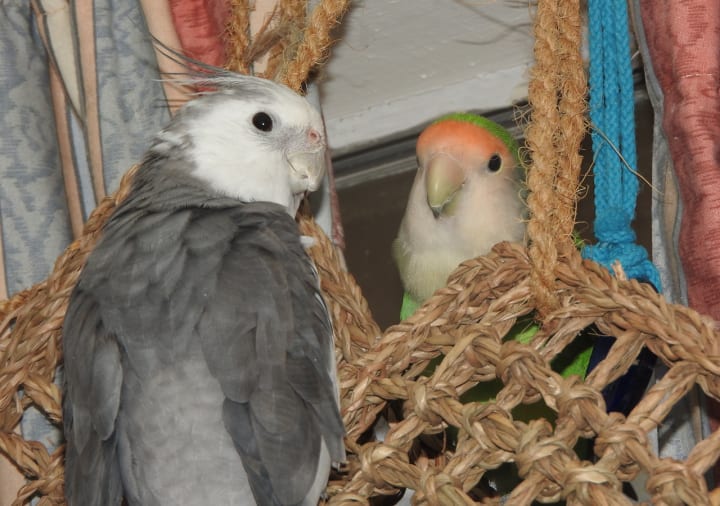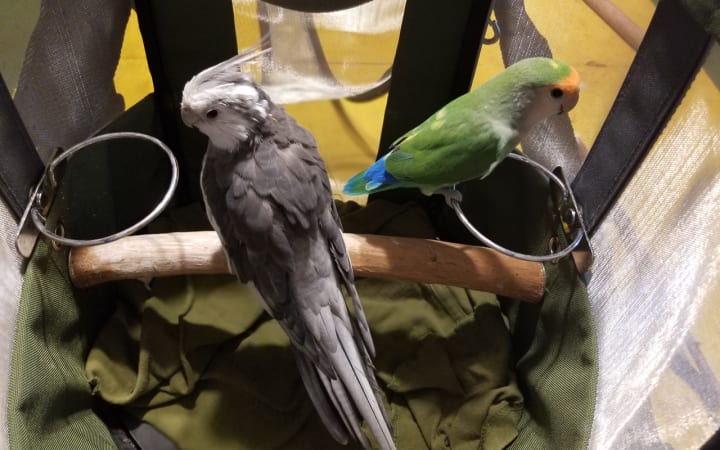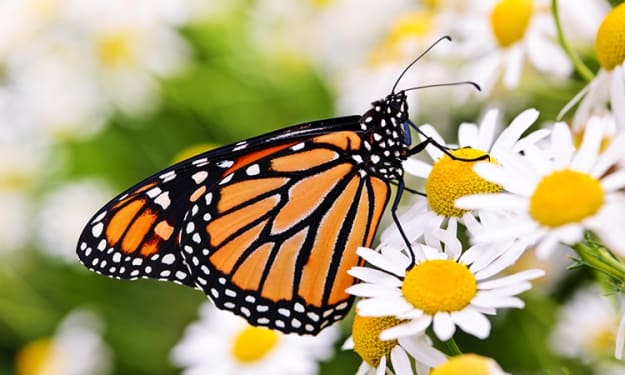What a Cockatiel Teaches Me About Life, Love, and Neediness
My 25-year-old senior cockatiel is a sweet baby who soaks up attention

My white-faced cockatiel Boobear has turned 25, and he’s still going strong. The normal life expectancy of these small domestic parrots is roughly 15 to 25 years, but some senior birds live into their thirties. I have high hopes this chubby little character will do the same.
Several years ago, when I did the original rescue, a previous rescuer knocked a couple years off his age. Not by intention, I’m sure. The difference between 17 and 19 is not so much in a cockatiel. His first owner of many years had passed away. Details got blurred as the heirs tried to find a new home for an older and needy bird.
Once Boobear had settled in and relaxed enough to let me clip his toenails, I took the opportunity to read the date on his well-worn band: 07/96.
As of July 2021, Boobear has arrived at his first quarter-century. 🎂 Bring on the birthday millet and the party hat Instagram stickers.
Hasn’t slowed him down a bit. As far as I can tell, he thinks he’s still in the springtime of his life.

A needy bird
Boobear’s story gives us an interesting look into psychology. When I said “older and needy,” you may have imagined a mature bird suffering from the usual indignities of old age. Not at all.
Oh, he’s a picky eater, and his diet isn’t ideal. He thinks exercise is for suckers and has a million cute tricks to get you to carry him around. As a result, he’s on the rounder side of the shape spectrum.
Nonetheless, as far as his physical health goes, he’s a strong bird who can (knock on wood) look forward to many more good years.
Emotionally needy is what I’m talking about here. When I was a kid, we called it being neurotic. Now, we probably call it an attachment disorder.
By any name, he’s a highly social critter who can’t tolerate being alone. In other words, he’s needy AF. In a previous life, he must have been a celebrity. He lives to be the center of attention.
Every waking moment of the day.

A social species
A lot of this neediness is natural to his species. Although white-faced cockatiels are a mutation developed after decades (if not centuries) of captive breeding, you can still look at wild cockatiels to learn something about their behavior. Like many parrots, they are extremely social birds who live in busy, active flocks for most of the year.
Being alone isn’t something that happens for a cockatiel when things are going right in a state of nature. Being alone means the last thing you see before you die might be the oncoming claws of a hungry falcon.
Therefore, they have a surprisingly piercing contact call they can use to make sure they know where their mate is at all times.
If you’ve ever had a cockatiel escape in your neighborhood, you probably noticed the bird’s loud voice. When one of my neighbor’s cockatiels got loose, I knew right away because heard him from my backyard — even though he was down the street and up a seventy-foot tree.
Don’t worry. The noisy boy came back unharmed after a few days. In fact, it was the sound of his mate’s call that pulled him back home.
A cockatiel’s natural voice evolved to carry. You might rarely hear a pet’s voice dialed up to the max because life in the home is pretty soft, and what’s there to cry about? But they’ve got a heck of a voice they can unpack if they want to.

The sad reason he started crying
A cockatiel’s natural need for love is rarely a bug. It’s a feature. After all, most people who choose a dog or a smaller parrot as a pet are looking for a companion. It’s nice if the dog or parrot is beautiful, but the primary motive for owning these pets is the uncritical love they offer.
So why did Boobear’s neediness cause him to end up being rehomed?
From what I’m told, Boobear was close to his first owner for many years. For a lot of those years, she was retired, and they could spend almost all their time together. He cried when she passed away.
The heirs, who were probably grieving themselves, scrambled to find a new home for a crying, noisy, older bird. At some point, Boobear found himself isolated in a tiny cage.
He cried more. And louder.
Eventually, a woman who already had a female cockatiel offered to take him. The two cockatiels could provide companionship for each other.
That’s… usually a perfectly good plan.
Problem. He likes her, but she doesn’t like him. Every time the female cockatiel goes out of his sight, he’s crying again. His neediness is all too much for her. She begins to push him around.
“She knocks him off his perch,” is the story I heard. “I can’t keep them together.”
And, every time he’s left alone, he starts in with the crying. Female cockatiel has a lower opinion of him than ever.
Vicious circle.
On top of the crying, Boobear plays another card to demand extra attention from his new human owners. If asked to fly here or there, he won’t. He stands and cries instead until somebody comes over to pick him up.
“He can’t fly,” the rescuer warned me. “I haven’t clipped his wings, because he doesn’t know how. You’ll have to take him everywhere.”
There’s needy, and then there’s ridiculous.

How we met
At her wit’s end, the rescuer asked around on Twitter to see if anyone had any ideas. I really can’t explain anymore how I knew it would work, but intuition told me I could give this senior bird a good life. I had a lot of room, I work out of a home office, and I already owned several older birds.
Boobear would never need to feel alone for even a minute. I remember a tingle of intuition speaking very strongly to me: You can make a difference for this bird.
Now, I always quarantine my birds 30 days before I introduce them to the flock. During that 30 days, I found out exactly what the previous rescuer meant. She hadn’t invented or exaggerated a thing.
Boobear cried every single time I stepped out of sight. And he wouldn’t stop crying until I came back. He simply couldn’t be left alone.
No big deal for me. Since I work at home, this wasn’t a terrible problem. During his quarantine period, I got a lot of work done with Boobear perched on my knee.
I also had abundant opportunity to observe the, “I can’t fly” routine.
Basically, everything the lady said about him was true.
Funny thing is, her nightmare bird has been my dream bird.

True love appears
As it happens, I also have a tame Peach-faced Lovebird that was rescued from a hurricane in 2012. You can read more about Nyota here:
If you know anything about lovebirds, you probably know they like nothing better than going two by two. In fact, they have a bit of a reputation for developing a coupled-up “us against the world” attitude.
As a rescue in a house of conures (and one Amazon), Nyota spent a lot of one-on-one time with me. However, she’s quite an active little presence, and I knew she would enjoy a feathered buddy.
Cockatiels are bigger but more approval-seeking. She was smaller but more boisterous. I felt it could work.
After Boobear had a clean bill of health, I slowly introduced the two of them. At first, I simply allowed them to see and talk to each other from their individual cages. Then, I began to allow them to play on parrot gyms that weren’t the exclusive territory of either bird.
As you can probably tell from the pictures, they hit it off like gangbusters. They’ve been devoted pals ever since. Their relationship is truly a delight to see.

Deep thoughts
Boobear has gone from problem bird to dream bird. And yet Boobear hasn’t changed. His personality is what it is.
He’s still needy. He will always be needy. When, for some reason, he must be alone for a moment or two — usually when I’m guiding Nyota on her flight back to the screened bird porch — he still begins to cry.
No big deal. His little sobs are brief and don’t much bother anybody because in a minute or two, I’m back with him or I’ve got another bird back with him.
He presents as middle-aged, but a 25-year-old cockatiel is a legit senior bird. He’s from a species where being alone is truly a terrifying thing. In other words, his core personality is never, ever going to change.
And you know what? It doesn’t matter. He’s enough. He was never broken. He was never a problem bird.
He was a bird in a situation he wasn’t meant for.
The same bird, in a situation suited to his psychology, is a happy bird who makes those around him happy too. The neediness and attention-craving aren’t an annoyance. The neediness is suddenly cute. Who doesn’t adore being needed?
His friendship with Nyota fascinates me. It’s the ultimate proof that Boobear never needed to be changed into something he can’t ever be.
He needed to find someone who delighted in him as he is.
There’s a takeaway here for all of us.
We can’t always change who we are. But we can be open to the idea that we’re not broken — that there’s someone out there, perhaps a completely unexpected someone, whose life will be better if we’re exactly who we are.
Author's Note
This article originally appeared in Found In My Journal, a Medium publication. All photographs are my birds photographed by me. All rights reserved. If you enjoyed this story, please gently tap the <3 button to let me know. I also accept and appreciate tips.
About the Creator
Amethyst Qu
Seeker, traveler, birder, crystal collector, photographer. I sometimes visit the mysterious side of life. Author of "The Moldavite Message" and "Crystal Magick, Meditation, and Manifestation."
https://linktr.ee/amethystqu







Comments (1)
please don't stop keep going on , you are doing great job